Colloquia for Spring 2026
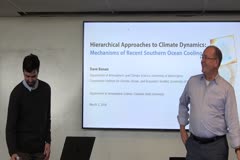
Hierarchical Approaches to Climate Dynamics: Mechanisms of Recent Southern Ocean Cooling
March 02, 2026
Dave Bonan
Hosted by Jim Hurrell
Earth’s climate is shaped by complex interactions among the atmosphere, ocean, cryosphere, and land, making the causes of historical change difficult to isolate. Hierarchical approaches that progressively build complexity are often needed to explain these changes and resolve model–observation discrepancies. In this talk, I demonstrate how such methods reveal the mechanisms behind a…
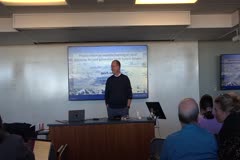
Physics-Informed Machine Learning of Cloud Processes for Next Generation Earth System Models
February 26, 2026
Kara Lamb
Hosted by Jim Hurrell
Earth System Models (ESM) encode our knowledge about the physical world, enabling both short-term weather and long-term climate prediction. Because these models cannot explicitly resolve all relevant physical processes, they rely on simplified parameterizations of sub-grid-scale processes such as clouds, turbulence, and convection, which remain a persistent source of uncertainty. While recent…
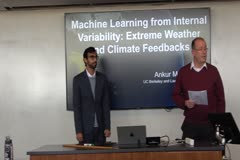
Machine Learning From Internal Variability: Simulating Weather Extremes and Climate Feedbacks
February 23, 2026
Ankur Mahesh
Hosted by Jim Hurrell
In a warmer climate, how will extreme weather events change? And how will average rainfall shift as the climate responds to greenhouse gases? Answering these central scientific questions is difficult because physics-based climate models are computationally expensive and uncertain. In this talk, I will show how machine learning (ML) weather emulators trained on historical data can answer…
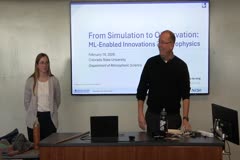
From Simulation to Observation: ML-Enabled Innovations in Cloud Microphysics
February 19, 2026
Emily de Jong
Hosted by Jim Hurrell
Cloud microphysics—the processes governing droplets, ice, and aerosols at microscale—remains a leading source of uncertainty in atmospheric modeling and climate predictions. A fundamental challenge is the scale mismatch between sparse or coarse observations and the detailed microphysical data needed to advance our understanding of atmospheric processes and validate predictive models. This…
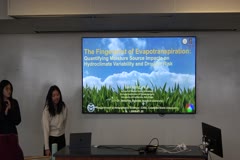
The Fingerprint of Evapotranspiration: Quantifying Moisture Source Impacts on Hydroclimate Variability and Drought Risk
January 22, 2026
Yan Jiang
Hosted by Dien Wu
Precipitation regimes over global croplands are sustained by complex moisture transport pathways from land and ocean. Since oceanic and terrestrial evaporation regulate rainfall patterns and seasonality in distinct ways, disturbances in these sources can expose downwind croplands to different hydrological risks. Beyond traditional climate and hydrological modeling, a key question for food…
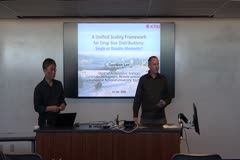
A Unified Scaling Framework for Drop Size Distributions: Single or Double Moments?
January 15, 2026
GyuWon Lee
Hosted by Michael Bell and Kristen Rasmussen
Drop size distributions (DSDs) are fundamental to advancing our understanding of precipitation microphysics and improving quantitative precipitation estimation and forecasting. Since Marshall and Palmer (1948) parameterized DSDs using a single-parameter exponential function, their explicit representation has become a key component of both remote sensing retrievals and numerical weather…
